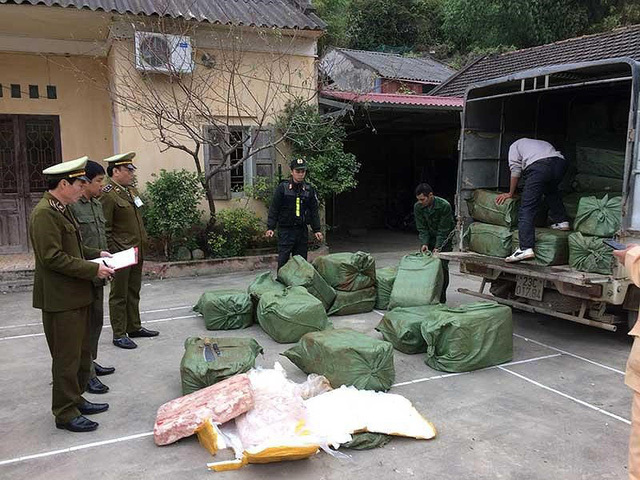This has raised tlconcern that Vietnam may become a dumping ground for refused meat with no clear origin.

The Lang Son provincial Market Control Department some days ago discovered 720 kilograms of pig brisket which had a bad odor carried by a truck.
Adhesive tape with Chinese words were found. However, there was no document showing the origin of the products and quarantine certificate.
A high number of consignments of meat with unclear origin have been found recently.
|
The Lang Son provincial Market Control Department some days ago discovered 720 kilograms of pig brisket which had a bad odor carried by a truck. |
Dieu Huyen, a housewife in Tan Phu district in HCMC, said she usually buys imported meat from supermarkets, meat shops or orders meat online. She always carefully reads the information on the packing, but feels insecure about the products, because they don’t show details about the origin of products.
“The labels only show the meat is imported from Australia and the US. Sometimes there is information about the importer,” she said, adding that she fears the imported meat is unsafe.
Nguyen Kim Doan, deputy chair of the Dong Nai provincial Livestock Association, warned that if management agencies cannot keep strict control over imports, Vietnam may become the dumping ground of expired and refused meat.
“It is Vietnamese consumers who suffer the most,” he said.
The Vietnamese Embassy in Australia has cited a report of the Australian agriculture department as showing that 33 consignments of live animals had been exported by sea to Vietnam by the end of May 2019. These included 90,560 cows and 397 buffalos.
More than 1,500 cows and 99 buffalos dif not reach Vietnam or disappeared from approved slaughterhouses in Vietnam over the past 13 months.
The country's agency said the requirements on the export supply chain quality were ignored.
Pham Duc Binh, general director of Thanh Binh JSC, said Vietnamese state management agencies need to ask export countries to share the information about product sources. He said the cooperation between the export and import countries in information tracing will help prevent trade fraud and ensure safety of products.
“It is necessary to prevent dirty meat right at border gates and ports. This is an important measure to protect consumers and the domestic livestock industry,” Binh said.
According to the HCMC Industry and Trade, in the first six months of the year, 5,647 tons of pork went through the city’s customs agency, a sharp increase of 4,800 tons compared with the same period last year.
The imports were worth $10.29 million, or$8.1 million higher than the same period last year. The import price was VND30,000 per kilogram, much lower than the domestic price.
Kim Chi

Agriculture Ministry suggests meat stockpiling to pre-empt pork shortage
Vietnam is seeking solutions to prevent pork supply shortage in the coming time as African swine fever continues to spread.
 The volume of pig, chicken and pork imports has soared recently. Buyers and sellers conduct transactions easily online.
The volume of pig, chicken and pork imports has soared recently. Buyers and sellers conduct transactions easily online.